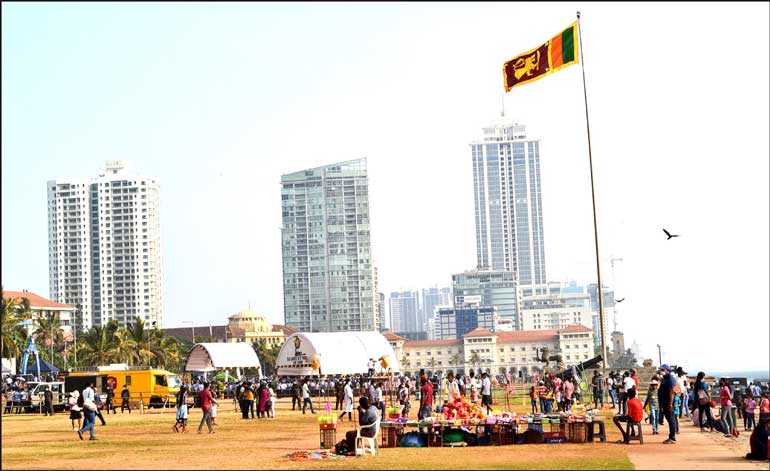Tuesday Feb 17, 2026
Tuesday Feb 17, 2026
Friday, 14 May 2021 00:00 - - {{hitsCtrl.values.hits}}

If Sri Lanka is to be saved from the present crisis, it is essential that the country should be orientated towards a structural reform program with the consensus of all political parties – Pic by Shehan Gunasekara
 This article has been compiled in response to a request made by a prominent politician in Sri Lanka. In the course of a telephonic discussion I had with him on the present crisis of Sri Lanka, I was critical of the sectarian behaviour and factionalism of political parties and explained that if Sri Lanka is to be saved from the present crisis, it is essential that the country should be orientated towards a structural reform program with the consensus of all political parties. I also told him that we should go for elections only after accomplishing this need.
This article has been compiled in response to a request made by a prominent politician in Sri Lanka. In the course of a telephonic discussion I had with him on the present crisis of Sri Lanka, I was critical of the sectarian behaviour and factionalism of political parties and explained that if Sri Lanka is to be saved from the present crisis, it is essential that the country should be orientated towards a structural reform program with the consensus of all political parties. I also told him that we should go for elections only after accomplishing this need.
Having listened to me carefully, he requested me to prepare a blueprint containing major principles that could be used as a basis for a public debate on the subject. This article can be perceived as an outcome of that.
In this document I have included only five main proposals that I believe should be included in a reform program aimed at overcoming the crisis facing Sri Lanka. I am convinced that these proposals will provide a rough idea of the nature of the reform path we should choose and a basis for discussion.
I am of the view that the implementation of the proposed reform program will enable Sri Lanka to re-create a democratic state that upholds the rule of law which will lead to liberating the country from the colossal debt trap and overcoming the crucial issues of disintegration of the social order and the failure of the State.
The blueprint that contains my proposals for discussion is as follows:
I. Nation building
All necessary steps must be taken to rebuild the ‘Sri Lankan Nation’ that has not been possible since independence.
(a) The necessary provisions should be made to abolish the recognition accorded to the caste system and discrimination based on it, both in Sinhala and Tamil society, and to ensure equal human dignity and equal rights for all. The land use system based on the Viharagam and Devalagam Ordinance in Sri Lanka, and the feudal service system rooted in the caste system, and associated with the former also should be abolished.
(b) Thoroughly investigate the damage done to the Burghers, upcountry estate Tamils of Indian origin, the Tamils of the north and the east, and the Muslims, as a mark of atoning for the prejudices inflicted on minority communities.
(c) Look into the unresolved issues and grievances associated with the actions taken to quell the violent uprisings in the Sinhala south and the Tamil north and mete out justice to all those who have been affected.
(d) There should also be a formal inquiry into the Easter Sunday attacks that took place in 2019.
(e) Necessary arrangements should be made to create a strong political culture in which the people would not be subjected to harassment, discrimination or marginalisation on account of the ethnicity or religion they belong to.
(f) All those who have left Sri Lanka from time to time due to various discriminatory and oppressive reasons should be invited to return to Sri Lanka.
II. Establishment of a sound judicial system
The establishment of a sound judicial system is one of the most important prerequisites in overcoming this crisis. The powers of the Judiciary were curtailed by the 1972 Constitution.
Most of the powers of the Judiciary snatched away by the 1977 Constitution have not been restored. Instead, during President Chandrika’s regime, the Judiciary was made a pawn of the Executive by appointing a corrupt person who was loyal to the President, to the post of Chief Justice. During the reign of Mahinda Rajapaksa, this grip was further tightened. Sri Lanka now has a Judiciary with a broken spine. If the country is to be transformed, the status quo of the Judiciary should be changed.
(a) The deterioration of the Judiciary should be looked into with the assistance of the Judiciary also.
(b) While removing the corrupt judges from the judicial service, reforms that will enhance the legal competence, analytical ability, and responsibility and moral integrity of judges in a system of democratic governance should be introduced.
(c) The Judiciary should be made a powerful institution by restoring all powers, including the “power of judicial inquiry” snatched away from it.
III. Adoption of an appropriate system of governance
Review the whole system of governance (Central, Provincial and Local government) which is in a confused state, and adopt a democratic system of governance in which the rule of law reigns and apposite devolution of power is ensured so that it would lead to efficient rule, confidence and respect of the people.
(a) The process of constitution making for this should deviate itself from the old system which was limited only to the Members of Parliament; instead, the most up-to-date system of “Participatory Constitution Making” which is considered to be the 21st Century model of Constitution Making which provides for broader public representation must be adopted. The aim of this system is to create a modern system of governance, a new social system and a State, a system of values and a common ideology through a constant dialogue that brings together all the big and small social groups in the country without exclusion.
(b) The three principal power centers of the State (the Legislature, the Executive and the Judiciary) shall be established in such a manner that one center of power cannot override the other two centers.
(c) The Head of State shall be subjected to the law of the land and the judiciary should have the power to invalidate any act which he or she commits contrary to the law and detriment to the country.
(d) The provisions prohibiting the Head of State misusing public property in his temporary custody should be included in the constitution.
(e) Strict laws should be enacted to prevent all representatives of the people, including the Head of State, from doing business with the Government.
(f) Restrictions on the amount of money that the candidates or political parties contesting elections could receive from individuals and companies, and the amounts that could be used as election expenses, should be imposed. Also, it should be made mandatory for the individuals and the political parties to submit audited accounts of financial support received and expenses incurred in elections.
IV. Empowering the public.
The right of the people to exercise their sovereign power should not be limited only to the right to vote in elections; a system of direct democracy being practiced in several countries should be introduced, allowing the public to directly intervene in special cases where public intervention is required. The instruments of direct democracy could contribute to make existing institutions and processes perform more effectively.
(a) Taking into account the direct democracy mechanisms in operation in Switzerland and other neighbouring countries, such as “popular initiative” and the right of “optional referendums” which could be cited as examples that allow a large number of people to join together and present a no-confidence motion to the Parliament against corrupt politicians or leading government officials when the government does not enforce the law against such corrupt persons. Sri Lanka too could introduce similar measures to suit the country context. Similarly the public could be empowered to submit proposals to Parliament for legal reformations as well.
V. Location of the country and its geopolitical reality
Apparently, Sri Lanka has formulated its foreign policy without taking into consideration the enormous strategic importance it has gained by virtue of its location as an island in the Indian Ocean. Sri Lanka is located in the Indian Ocean at the crossroads of sea routes to Europe, India, the Far East and Australia. The number of ships plying this sea route is around 36,000 a year. The ports in the Indian Ocean account for about 30% of world trade. Due to these reasons and its location, Sri Lanka has gained a great importance; consequently, Sri Lanka’s foreign policy has become a sensitive issue affecting both the global and regional powers.
(a) Sri Lanka has become a country under the grip of China due to the convenience in obtaining loans and undue benefits that politicians could accrue from it. This situation has caused great dissatisfaction among the Western powers as well as India, which can be considered as Sri Lanka’s closest neighbour; and this situation could lead to causing great problems for Sri Lanka. This does not imply that Sri Lanka must pursue an anti-Chinese policy; but being a country located at the mouth of India, it will not be to the best interest of Sri Lanka to act as a partner in a Chinese program that would be strongly opposed by India. In view of Sri Lanka’s location and world conditions, it is important to explore the possibility of adopting a new foreign policy that will benefit Sri Lanka.